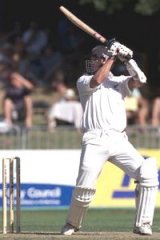Chris Cairns
|
|

|
New Zealand were facing Sachin Tendulkar's Indians in the second of three Tests. India had the untaxing task of scoring 92 to win, an uneventful end to an unmemorable match for New Zealand. But Chris Cairns wanted to seize a moment. Sitting on 130 Test wickets, he was desperate to lift that total to 131 to go ahead of his father, folk hero Lance, on New Zealand's roll of honour. And, in the throes of defeat, came the triumph he craved, as he castled opener Sadagoppan Ramesh for five. He didn't just savour it, but made a grand statement with his next delivery. This was no rhythmical thing of cricketing beauty, rather an uncoordinated flurry of arms, the ball unmistakeably delivered off the wrong foot - the way Bernard Lance Cairns did. As the "son of" said, it was his tribute to "the old man".
That moment meant much to the man himself, but it was his string of wondrous deeds earlier in the year that really had the cricketing world paying attention. Back home, Cairns's batting was critical against India, a half-century contributing to victory in Wellington and a restrained 126, only his second Test hundred, batting the tourists out of contention in Hamilton to secure a series win. It was also Cairns the batsman, rather than the bowler, who excited in the one day games against India, and at Christchurch he made a hundred off just 75 deliveries, New Zealand's fastest in limited-overs internationals, with seven sixes.
In such mood, he seemed destined to prosper in England, both at the World Cup, then on the tour to follow. Excel he did, boosting New Zealand's run to the World Cup semi-finals with his all-round contributions, including a blistering 60 in the famous five-wicket win over eventual champions Australia. For all that, the Test series against England was Cairns's tour de force. His six-wicket haul was a key ingredient in New Zealand's nine-wicket win at Lord's and, in the series decider at The Oval, he was matchless. He began with five wickets, but the jewel was his last innings of the tour. New Zealand were 39 for six and leading by just 122 when he took guard - and instantly applied the blowtorch to England's attack. When it was all over, he had 80 beside his name from only 94 deliveries, a priceless and daring innings which effectively won the series: England folded in the run-chase and lost by 83 runs. With series returns of 183 runs and at 30.50 and 19 wickets at 21.26, Cairns was unquestionably New Zealand's outstanding performer.
That CHRISTOPHER LANCE CAIRNS should be able to deliver all-round performances of such substance and panache is no surprise. It was in the genes. He was born in Picton (like his father) on June 13 1970, and cricket was an inescapable part of his upbringing. By the time he was five, he was already showing prodigious ability. He could play rugby too, and was a reserve for the New Zealand Under-17 side against Australia in 1987. Cricket, though was the constant in his life, a passion developed in Dunedin when Lance switched from Central Districts to play for Otago in 1976.
Throughout these times, Chris's goal was to play for New Zealand, and almost everyone wondered when rather than if. By 1988, he was treading in Richard Hadlee's footsteps at Nottinghamshire, where he made his first-class debut. He was still only 18 when he made his maiden century for Northern Districts. But though his career was headed in just one direction, it would also prove to be studded with setbacks. In his Test debut against Australia in November 1989, he suffered with a back injury. He had a kidney operation, various injuries and conflicts with officialdom (he quit mid-tour in the West Indies in 1995-96). But all those paled beside the devastation he felt when his sister Louise was killed in a train crash in 1993.
Trying to cope with such events, Cairns would tantalise one moment only to regress just as quickly. The good would be very good, like the first Test hundred, 120 in 96 balls against Zimbabwe in 1995096. But there were many periods of mediocrity. He is far more pure, in the technical sense, than his father, who worked on instinct and effect, and to hell with the style. Yet, after ten years in elite company, the younger Cairns had played only 42 Tests by the end of the 1999-2000 tour of India, with his batting average still below the 30-mark, his bowling average above it. His one-day output mirrored those figures.
But in the short home series against West Indies that followed, he truly began to do justice to his luminous talent: 17 wickets in two Tests, including a devastating seven for 27 at Hamilton, figures surpassed in New Zealand Test history only by Hadlee. At the start of 2000, Cairns had a claim to be considered the game's pre-eminent all-rounder. Even Hadlee struggled to stay that.

